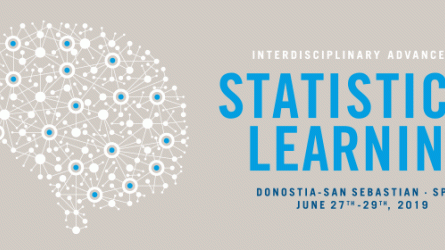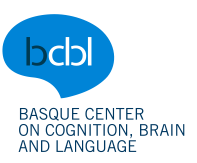
International Conference on Interdisciplinary Advances in Statistical Learning 2019
Description
The conference will discuss statistical learning and its underlying mechanisms from behaviour to neuroscience, in various domains such as language, music, vision, and audition, with data from adult participants, development, individual differences, computational modeling, and non-human species. The conference will include invited speakers, regular talks, panel discussions, and poster sessions.
Objectifs
To promote, through talks and symposiums, the exchange of ideas within the field of statistical learning among international experts of different disciplines.
To share the results obtained through research carried out in this area.
To build working arrangements between experts from the Basque Country and international experts.
To consolidate San Sebastián as the key meeting point for international researchers.
To flesh out this groundbreaking and pioneering area.
Activité s'adressant à
- Alumnado universitario
- Estudiantes no universitarios
- Profesorado
- Profesionales
Directeurs

Manuel Carreiras
BCBL - Basque Center on Cognition, Brain and Language
Manuel Carreiras is the scientific director of the BCBL (Basque Center on Cognition, Brain and Language, Donostia-San Sebastián, Spain) that was awarded in 2015 the “Severo Ochoa” label of excellence for a period of 4 years starting in 2016. He is also IKERBASQUE research professor, Honorary Professor of the University College of London (UCL), and Distinguished Researcher of the University of the Basque Country (UPV/EHU). His research focuses on reading, bilingualism and second language learning. He is the editor in chief of Frontiers in Language Sciences, and associated editor of Language, Cognition, and Neuroscience and of Brain and Language. He has published more than 250 papers in high impact journals in the field. His research has been funded by different research agencies. He was the coordinator of the Consolider-Ingenio2010 grant entitled COEDUCA, and Principal Investigator of the ERC (European Research Council) advanced grant entitled Bi-Literacy and of a Health Research 2018 La Caixa Foundation grant entitled DysThal. He has been recipient of the Euskadi Research prize 2015, and of the Spanish National Research prize in Social Sciences Pascual Madoz, 2019.
Conférenciers

Lori Holt
Carnegie Mellon University
Lori L. Holt is a Professor of Psychology at Carnegie Mellon University and is affiliated with Pittsburgh’s Center for the Neural Basis of Cognition. She has been a member of the Department of Psychology and the Dietrich College of Humanities and Social Sciences at Carnegie Mellon University since earning her Ph.D. from the University of Wisconsin-Madisonin 1999. Dr. Holt is the recipient of a 21st Century Scientist Award for Mind, Brain and Behavior from the James S. McDonnell Foundation and her research has been recognized by awards from her peers at the Acoustical Society of America, the American Speech, Language and Hearing Association and the National Organization for Hearing Research. In 2007, the Association for Psychological Science named her a Rising Star in Psychology. In 2013, Dr. Holt was awarded the Troland Research Award from the National Academy of Sciences. Dr. Holt is an expert in auditory cognitive neuroscience.

Simon Kirby
Centre for Language Evolution, University of Edinburgh
My work concerns the origin and evolution of language, and the unique ways that culture and biology interact in our species. I have pioneered a new approach to understanding cultural evolution of behaviours such as language which we call Iterated Learning. A number of research groups around the world - in addition to my own - are now studying Iterated Learning using techniques as diverse as mathematical modelling, computational simulation, and psychological experiments. My view is that a complete understanding of human nature requires an account of the complex interactions between individual learning, cultural transmission and biological evolution in human populations. In addition, I pair my scientific research with artistic output by collaborating with sculptors and musicians to create interactive installations exploring issues of communication and cultural evolution in a socially and informationally promiscuous world. So far, I have exhibited six such artworks nationally.

Jay McClelland
Stanford University
I am a Professor in the Psychology Department and Director of the Center for Mind, Brain and Computation at Stanford. My research addresses a broad range of topics in cognitive science and cognitive neuroscience, including perception and perceptual decision making; learning and memory; language and reading; semantic and mathematical cognition; and cognitive development. I view cognitive functions as emerging from the parallel, distributed processing activity of neural populations, with learning occurring through the adaptation of connections among participating neurons, as discussed in Parallel Distributed Processing (Rumelhart, McClelland, and the PDP Research Group, 1986). Research in my lab revolves around efforts to develop explicit computational models based on these ideas; to test, refine, and extend the principles embodied in the models; and then to apply the models to substantive research questions through behavioral experiment, computer simulation, and mathematical analysis.

Daphna Shohamy
University of Columbia
Daphna founded the Learning Lab at Columbia in 2007. Daphna received a BA from Tel-Aviv University, double majoring in Psychology and Humanities. She then went on to receive a PhD in Neuroscience from Rutgers University and trained as a postdoc at Stanford University's Psychology Department. Daphna is currently an associate professor in the Psychology department at Columbia University. The interdisciplinary research in the Learning Lab builds on joint efforts of many people, including undergraduate and graduate students, research assistants, postdocs and collaborators, with expertise spanning multiple disciplines, including psychology, neuroscience, psychiatry, genetics and computer science.
Tarifs inscription
| RESERVA | jusqu'au 01-05-2019 |
|---|---|
| 0 EUR |





